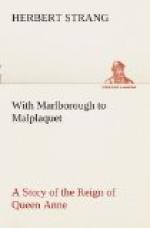When Blackett arrived on the scene with his regiment he found that a force of Eugene’s cavalry had taken the village of Oberglau, near the spot. A minute later, almost before the colonel had drawn up his men, there was a fierce shout, and there came thundering down upon the village, with almost irresistible shock, a body of the enemy.
“Irishmen, by Jove!” cried a man by Matthew’s side. “They’ll fight like demons!”
The attack, in truth, came from the Irish Brigade, a doughty body of Irishmen, exiles from their country, in the service of Louis. Before the Englishmen realized the situation the Irishmen had dashed clean through the force occupying Oberglau, and had taken up a position between the men and Eugene.
The confusion was extreme, and the allied troops could scarce be got to face the resistless Irishmen at all. Things looked desperate. The colonel of Blackett’s regiment, seeing the state of things at Oberglau, as he toured it, shouted, “Go and tell the Duke, Mr. Blackett!” and away dashed Matthew once more to the General. He was a pretty spectacle, but he did not give the matter a thought, and his news prevented the Duke from paying much heed to the condition of the messenger.
“Lead the way,” came the sharp order, and Blackett thundered on in front, the great commander with a body of men hard after him, to find the energetic and plucky colonel fallen badly wounded, and the regiment in difficulties. With a swoop, the reinforcements fell upon the Irishmen, and, almost for the first time, Matthew found himself engaged in a hand-to-hand encounter. He did not know how long the conflict lasted, but presently he found the enemy in full flight, his comrades cheering lustily around him. Marlborough’s promptitude had saved the situation.
“You fought like a very fiend, Blackett,” remarked the major, laughingly, a little later on, when for the moment operations had ceased, to which Matthew replied simply, “Did I, sir? I don’t remember anything about it,” whereat the major laughed again.
It was five in the afternoon, and there was a lull on the field. Up to the present neither side could be said to have gained any real advantage over the other. All the allied cavalry had crossed the stream, and the men wondered what would come next.
They were not left long in doubt. The order came to mass the horse in preparation for a grand charge. For a time the field was a scene of rapid and puzzling movement, but order was quickly evolved out of the seeming confusion.
Then the trumpet rang out, and there bore down upon Tallard a magnificent body of eight thousand cavalry. Bore down, we have written; the course was slightly upwards, as a matter of fact, from the stream. There was one check, and the Allies were stopped for a moment. Then like a whirlwind the horse dashed forward, at a tremendous speed.
It was too much. The French fired one volley, then turned and fled. On the Englishmen galloped, and in a few moments the enemy’s line was cut in two. In two different directions the French cavalry ran, and Marlborough followed after that section which was making for Blenheim. It was a wild stampede, and Matthew Blackett, as he dashed after the retreating enemy, always considered it the most exciting episode in his life.




